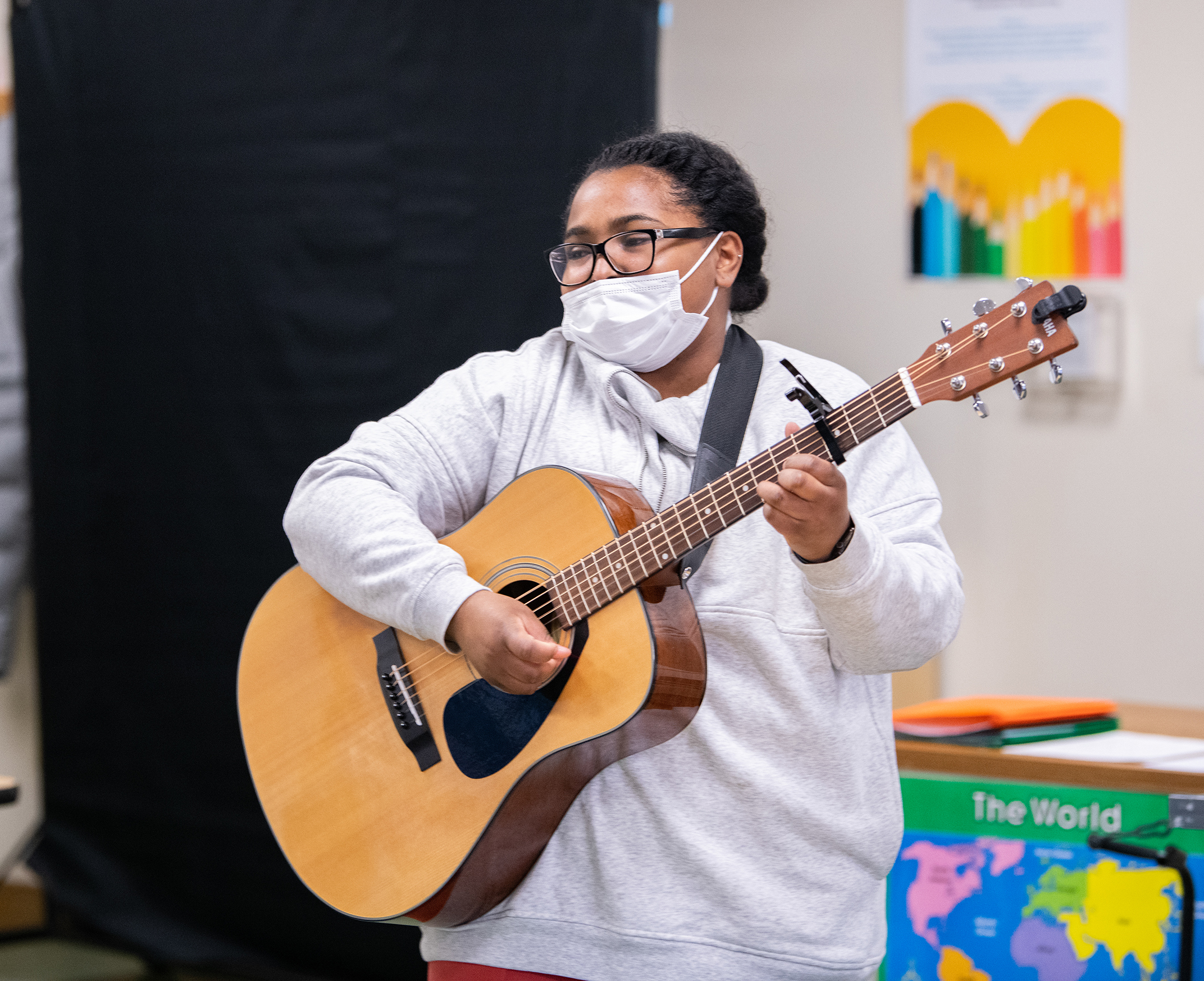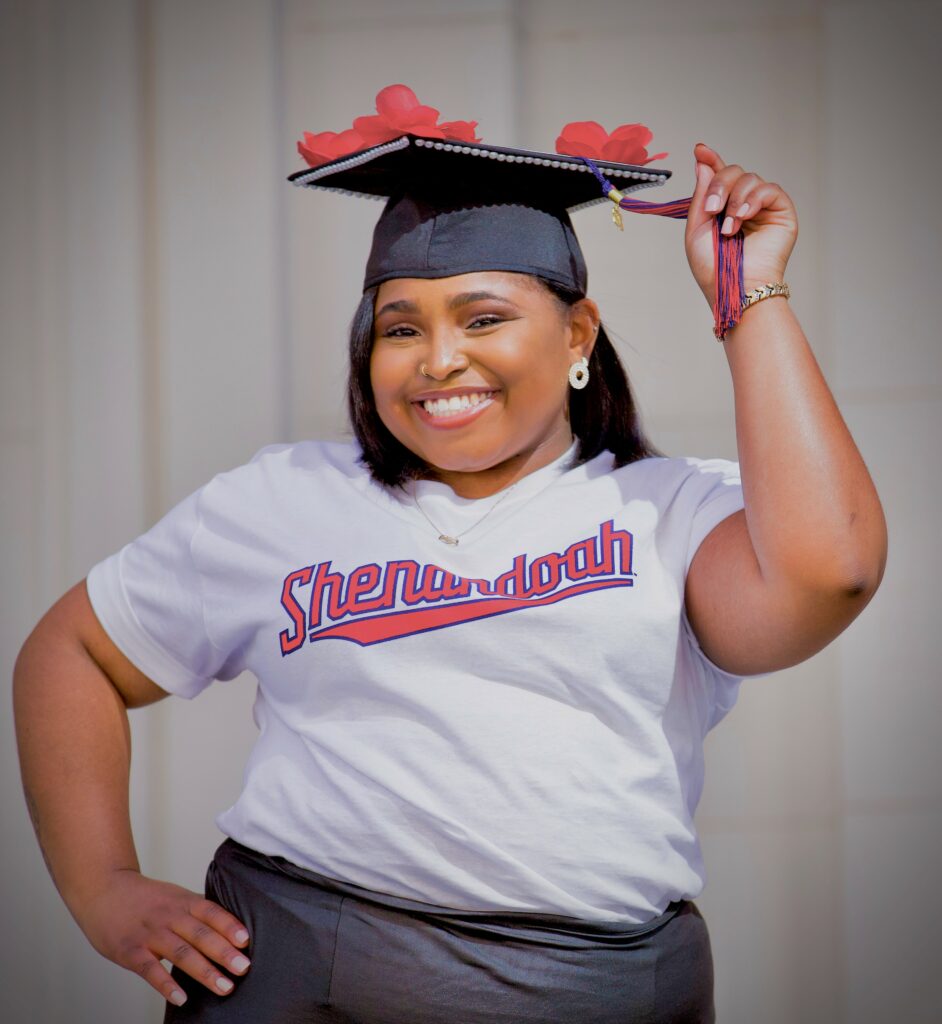
Employee Spotlight: Jayda Cook, Music Therapy Intern
Jayda Cook is graduating from Shenandoah University with a bachelor’s degree in music therapy this month. Since January, we’ve been fortunate to have Jayda as an intern at our Winchester campus. She has worked hand-in-hand with the head of our music therapy program, Fredrica Dooley-Brown, who also works as an adjunct professor at Shenandoah University. Jayda is a truly gifted music therapist, and we know she will go on to do amazing things!
Q: What attracted you to music therapy?
I always knew that I loved to sing, and I loved music—but I also wanted to help other people. I also knew that I didn’t want to perform on stage, so music therapy seemed like a perfect fit.
Q: How did you learn about Grafton?
I actually saw Fredrica working with Chimers, which is an on-campus group where adults with disabilities make music together with Shenandoah students. There was a concert coming up, and I would sneak in and watch the rehearsals.
I saw that Fredrica worked at Grafton, so I arranged to do a job shadow day with her in 2019, during my sophomore year. Observing her music therapy session made my heart jump. That day answered a lot of the questions I had about how the kids interact during music therapy and solidified that I was on the right path. It was a lightbulb that went on.
Q: Why did you decide to intern at Grafton?
At Grafton, you’re able to experience multiple client personalities and behaviors, in addition to working with different types of therapists. I also knew I wanted to work with kids, so Grafton had everything I was looking for.
Q: What has the internship been like?
The internship has been eye-opening in every aspect. Clinically, I’ve been able to see the kids grow and use music to understand what’s going on within their bodies. On an emotional level, it’s been amazing to build one-on-one relationships with the students. Kids will greet me in the hallway or say, “Can I talk to Miss Jayda?” Being able to build those genuine relationships with the students has been the biggest thing.
You see the world differently here. A lot of times, I take things for granted that other people may struggle with. For example, being able to talk fluently or being able to immediately understand what someone’s telling me. Sometimes, I need to give extra time for a student to process and understand. Working at Grafton has been an educational experience and a life lesson about how others may experience the world differently than me.
Q: What has it been like working alongside Fredrica?
AMAZING in all capital letters. It has been phenomenal. At Shenandoah, you learn the basics of music therapy, but here at Grafton, you have to put that into action. Seeing how Fredrica can connect with everyone and intuitively adapt in sessions—she’s like my superstar.
Q: What made you want to work with children with special needs?
Growing up in Richmond, I used to volunteer at the School of the Performing Arts in the Richmond Community (SPARC), which is a music academy that welcomes students with disabilities. We had a child who was deaf, another kid who was blind, and a few non-neurotypical kids. We would put on shows at the theater throughout my time in high school, and that was my first time working with kids with autism. It was a real learning experience.
After working with the children at SPARC and seeing the adults in the Chimers program at Shenandoah, I knew I had to work with this population.
I also have a family member who is autistic, and she loves music. I used to take her out for shopping and ice cream a couple times a month. While spending time with her, I found it bizarre how she could sing along to music and be expressive—but, without music, she struggled to make eye contact and express herself. I would play different music and see the ways it affected her.
I feel like we constantly ask people with autism to adapt to our world, yet we rarely try to adapt to their world. I want to be the person who is that bridge for them. I want to fill the gap between the world that we live in and the world that people with autism live in, without asking them to conform or change.
Q: Do you have a favorite story from your time at Grafton?
Yes. Fredrica and I co-treat a client who is working on his coping strategies. We were in a session one day, about two months into my internship, and the student began to take the lead. As the therapist, I was used to controlling the session structure, but this day was different. He would say, “Okay Miss Freddy, it’s time for you to sing. Okay Miss Jayda, it’s time for you to sing.” Suddenly, the three of us were making music together, like friends. I had never felt that before. We were all singing, all playing our instruments.
It was the first time I was able to let the music speak instead of letting words speak. It was so relieving. I felt like I just went through my own music therapy session. I realized that sometimes it’s okay to let go and be one with the music and the client.
Q: What do you hope to do after graduation?
That’s the No. 1 question. Right now, my plan is to stay in Winchester and find a job within the music therapy or human services field. Grafton’s Registered Behavior Technician (RBT) program has also been catching my eye. I believe you can never stop learning, and I’m curious to learn ways to help clients outside of music.
Q: What would you tell another college student who is thinking of interning or working at Grafton after graduation?
There’s so much knowledge to absorb inside this building. You can learn from the kids, from your supervisor, from another staff member, from the janitor. Be a sponge.
